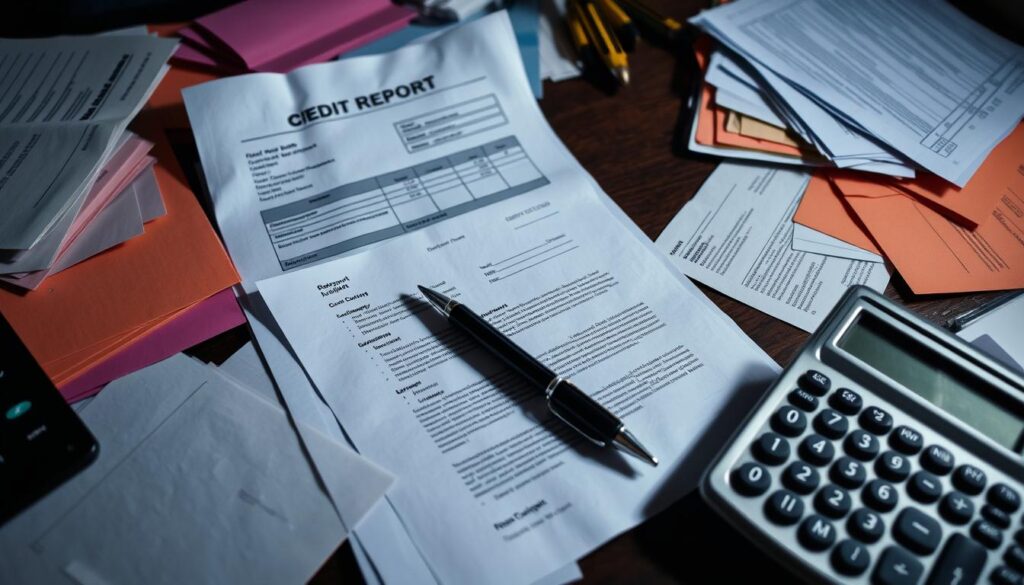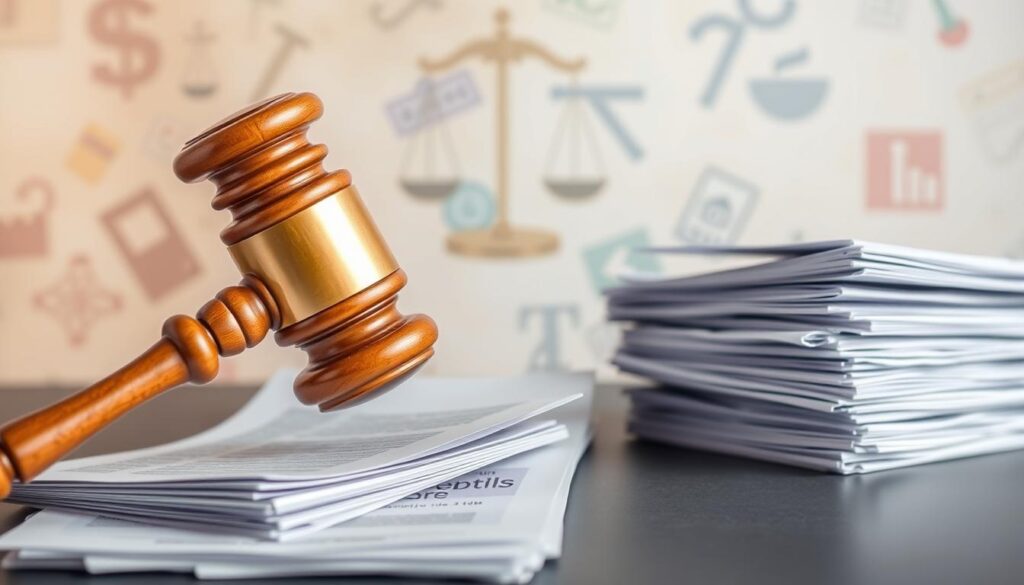Credit disputes can be tricky, but you can improve your score with the right approach. This article offers insider tips to challenge errors and remove negative items. You’ll learn effective techniques for successful credit repair.
We’ll explore strategies to dispute inaccuracies and boost your credit score legally. These methods will help you navigate the complex world of credit reporting. You’ll gain valuable insights to achieve your financial goals.
Key Takeaways
- Discover the power of credit dispute strategies to challenge inaccurate information on your credit report.
- Learn how to effectively identify and address specific credit report errors, such as fraudulent accounts or outdated information.
- Explore the benefits of the powerful Section 609 credit repair tactic and understand your rights under the Fair Credit Reporting Act (FCRA).
- Evaluate the role of credit repair companies in restoring your financial standing and uncover advanced credit restoration techniques.
- Develop a comprehensive understanding of the credit dispute process and persist through challenges to achieve success.
Understanding Credit Dispute Strategies
An accurate credit report is vital for a healthy credit score and good financial opportunities. Disputing credit report errors is a powerful tool. Learn about credit disputing to improve your finances and secure a brighter future.
What Is Credit Disputing?
Credit disputing challenges incorrect or unverifiable information on your credit report. This includes negative items like late payments and collection accounts. It also covers fraudulent activities that may unfairly affect your credit score.
Why Dispute Your Credit Report?
- Improve your credit score: Removing inaccurate negative items can boost your credit score, opening doors to better opportunities and lower interest rates.
- Ensure financial accuracy: An accurate credit report is key for making smart financial decisions and protecting your financial health.
- Protect your identity: Disputing credit report errors can help spot and fix potential signs of identity theft or fraud.
- Enhance your financial future: A strong credit score can help you secure loans, mortgages, credit cards, and even jobs.
Credit disputing helps maintain a healthy financial profile. It unlocks new possibilities for your future. Take control of your credit and shape your financial success.
Identify Inaccurate Negative Items
Your financial health depends on a good credit report. Spotting and fixing wrong or negative items can boost your credit score. Let’s look at how to check your credit report for problems.
Get a copy of your credit report from Equifax, Experian, and TransUnion. Check each report for credit report errors, negative items, and outdated information.
- Common credit report errors include wrong personal info, duplicate accounts, and accounts not yours.
- Negative items can be late payments, collections, charge-offs, and public records like bankruptcies.
- Look for outdated information that should be gone, like solved disputes or closed accounts.
After finding wrong or negative items, dispute them with credit bureaus. Give proof and explain why the item is incorrect. This takes time but helps improve your credit score.

Identifying errors and negative items is key to credit repair. Reviewing your report and fixing issues sets you up for money success.
Crafting Effective Dispute Letters
Disputing credit report errors can boost your financial health. A well-written dispute letter is crucial for success. Let’s explore how to craft a compelling letter for resolving credit report issues.
Key Components of a Dispute Letter
A comprehensive dispute letter should include these essential elements:
- Personal information: Your full name, address, and contact details.
- Specific credit report errors: Clearly identify the inaccuracies you’re disputing, including the account number, date, and any relevant details.
- Supporting documentation: Gather and attach any evidence that supports your claim, such as billing statements, payment receipts, or correspondence from creditors.
- Requested actions: Specify the actions you want the credit bureau to take, such as correcting the error, removing the item, or updating your credit report.
- Deadlines and follow-up: Provide a timeline for resolving the dispute and indicate your intent to follow up if the issue is not addressed within the required timeframe.
Addressing Specific Credit Report Errors
Tailor your approach based on the type of credit report error. Common issues include:
- Inaccurate personal information: Incorrect name, address, or other personal details.
- Fraudulent accounts: Accounts opened in your name without your knowledge or consent.
- Incorrect payment history: Reporting of late or missed payments that you’ve actually made on time.
- Outdated or unverified information: Outdated or unsubstantiated negative items that should be removed from your credit report.
Address these issues with supporting documents. This increases your chances of successful credit report error resolution.

Pay attention to detail and communicate clearly in your dispute letters. Stay persistent yet professional. Master this skill to take control of your credit.
With effective dispute letters, you can shape a brighter financial future. Take action today to improve your credit standing.
credit dispute tricks
Utilizing Section 609 of the FCRA
Section 609 of the Fair Credit Reporting Act (FCRA) is a powerful tool. It allows you to challenge wrong items on your credit reports. This law gives you the right to ask for proof of negative entries.
You can make credit bureaus check if negative items are correct. This legal provision helps you get details about how items were added. With this info, you can spot errors and fight unfair negative marks.
Section 609 puts the burden of proof on credit bureaus and creditors. They must show that the info on your report is accurate. This can be a big help in fixing your credit score.
- Section 609 allows you to request detailed information about the sources and verification processes used to include negative items on your credit report.
- This information can help you identify errors or inconsistencies that can be used to dispute the validity of the negative items.
- By exercising your rights under Section 609, you can put the burden of proof on the credit bureaus and creditors to validate the accuracy of the information on your credit report.
Using Section 609 can seem tough, but it’s worth it. With the right plan, you can use this law to your benefit. Know your rights and take action to improve your chances of success.

“Utilizing Section 609 of the FCRA can be a game-changer in your credit dispute efforts.”
Section 609 credit repair is a key way to fix your credit report. It helps you remove inaccurate negative items. This can boost your overall financial health.
Following Up and Persisting
Credit dispute can be daunting. Success hinges on persistence and diligent follow-up. Restoring your credit health requires a steadfast commitment to addressing concerns with credit bureaus.
Handling Credit Bureau Responses
Credit bureaus must investigate disputes and respond. Their initial response may not satisfy you. Review their findings carefully and know your Fair Credit Reporting Act rights.
Don’t be discouraged by unsatisfactory responses. Persistence is key. You can dispute the dispute and request a re-investigation.
This may involve resubmitting documents or providing new evidence. You can also escalate the issue within the credit bureau.

Credit bureaus must ensure accurate information on your report. Your credit dispute follow-up efforts can lead to success.
- Carefully review the credit bureau’s response and understand your rights
- If unsatisfied, persistently dispute the dispute and request a re-investigation
- Provide additional evidence and documentation to support your case
- Escalate the issue if necessary to ensure your concerns are addressed
Stay vigilant in your credit dispute follow-up. Navigate credit bureau interactions with confidence. Your efforts can lead to the credit restoration you deserve.
Knowing Your Rights Under the FCRA
Understanding the Fair Credit Reporting Act (FCRA) is vital for protecting your financial well-being. This federal law allows you to challenge inaccuracies in your credit report. Knowing your FCRA rights empowers you to safeguard your financial health.
The FCRA provides several key rights to help you manage your credit information. These rights ensure you have control over your financial data.
- Obtain a free copy of your credit report annually from each of the three major credit bureaus (Experian, Equifax, and TransUnion)
- Dispute any inaccuracies or errors found in your credit report
- Require credit bureaus to investigate and correct any verified errors within a reasonable timeframe
- Receive notice of any adverse actions taken against you based on information in your credit report
- Seek damages from credit bureaus or furnishers (companies that provide information to credit bureaus) for willful or negligent violations of the FCRA
These consumer credit protections enable you to actively monitor your credit report disputes. By exercising your FCRA rights, you can ensure your credit report’s accuracy.
Taking control of your financial future becomes easier when you understand these rights. Your credit report should reflect your true creditworthiness.
“Knowledge is power, and understanding your FCRA rights is the first step to taking control of your credit health.”
Leveraging Credit Repair Companies
Credit repair companies can help you fix your credit score. They identify and address errors on your credit report. These services can improve your overall creditworthiness.
Evaluating Credit Repair Services
Choosing the right credit repair company is crucial. Here are some factors to consider when selecting a provider:
- Reputation and Track Record: Look for companies with a proven track record of successful credit dispute resolutions and satisfied customers.
- Transparency and Pricing: Ensure the company is upfront about their fees and services, and that they do not engage in any deceptive or unethical practices.
- Compliance with Regulations: Verify that the credit repair company adheres to the Fair Credit Reporting Act (FCRA) and other relevant laws and regulations.
- Personalized Approach: A reputable credit repair service should provide a customized strategy based on your unique credit profile and needs.
Careful vetting helps you find a reliable partner. They can assist with credit repair, credit restoration, and professional dispute assistance. This support can help you reach your financial goals.
| Credit Repair Company | Reputation | Pricing | FCRA Compliance | Personalized Approach |
|---|---|---|---|---|
| Credit Pros | Excellent | $99-$199/month | Yes | Yes |
| Lexington Law | Reputable | $89.95-$129.95/month | Yes | Yes |
| Sky Blue Credit | Reliable | $79/month | Yes | Yes |
A good credit repair company offers valuable expertise. They can help you dispute credit report errors effectively. Their resources can aid in restoring your financial standing.
Advanced Credit Restoration Techniques
Advanced credit restoration strategies can boost your credit score beyond basic disputes. These specialized techniques tackle complex credit challenges. They go beyond standard credit repair methods for lasting improvement.
The “Debt Snowball” method is one powerful approach. It involves paying off debts, starting with the smallest balance. As you clear each debt, you’ll free up funds for the next one.
This strategy builds momentum and improves your credit utilization ratio. It’s a systematic way to tackle your debts effectively.
Credit mix optimization is another effective technique. It involves diversifying your credit portfolio with various account types. This includes credit cards, installment loans, and mortgages.
A diverse credit mix shows lenders you can manage different forms of credit responsibly. It can significantly boost your creditworthiness.
- Leverage credit-builder loans to establish a positive payment history and build your credit from the ground up.
- Become an authorized user on someone else’s well-managed credit card to piggyback on their good credit history.
- Explore secured credit cards, which require a refundable security deposit but can help you build credit if used responsibly.
Successful credit restoration strategies require a comprehensive approach. They address both immediate and long-term factors affecting your credit profile. Combine these techniques with diligent credit monitoring and responsible financial habits.
This approach can lead to lasting credit score improvement. It can unlock new opportunities and financial freedom for you.
| Technique | Description | Benefits |
|---|---|---|
| Debt Snowball | Prioritizing and systematically paying off debts, starting with the smallest balance first | Improves credit utilization ratio, builds momentum in debt repayment |
| Credit Mix Optimization | Diversifying credit portfolio with a healthy mix of account types | Demonstrates responsible credit management to lenders |
| Credit-Builder Loans | Loans that help establish positive payment history and build credit from scratch | Builds credit without requiring prior credit history |
| Authorized User Status | Becoming an authorized user on someone else’s well-managed credit card | Piggybacks on the positive credit history of the primary account holder |
| Secured Credit Cards | Credit cards that require a refundable security deposit to establish credit | Helps build credit when used responsibly |
Conclusion
Credit dispute tactics are powerful tools for financial empowerment. They help you control your credit score and build a stronger financial future. Understanding credit reporting and identifying inaccuracies are key steps in this process.
The FCRA protects your rights in credit disputes. You can address errors yourself or work with reputable credit repair professionals. These strategies can help you improve your credit score and open new financial doors.
Your credit report reflects your financial history. It’s vital to keep it accurate. By using these credit dispute success strategies, you’ll gain control over your finances. Take action now to create the financial future you want.

